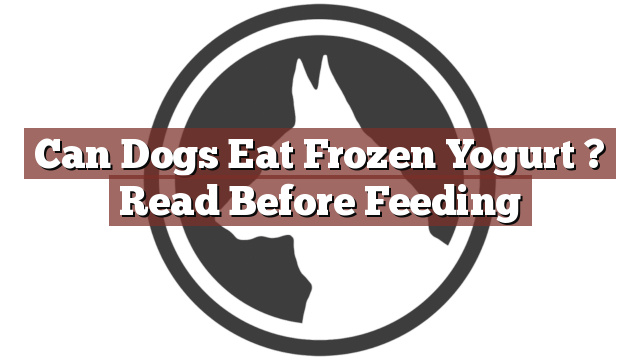Understanding Your Dog’s Dietary Needs
As responsible pet owners, it is crucial to understand our dog’s dietary needs to ensure their overall health and well-being. While dogs primarily thrive on a diet of high-quality dog food, there may be times when we consider sharing our own food with them as a treat. However, it is essential to remember that not all human foods are safe for dogs, and their digestive systems may not tolerate certain ingredients as well as ours.
Can Dogs Eat Frozen Yogurt? Read Before Feeding
Can dogs eat frozen yogurt? This is a question that many dog owners may have when they want to share a refreshing treat with their furry companions. The answer is yes, dogs can eat frozen yogurt, but with certain precautions. While frozen yogurt can be a delicious and cooling option for dogs, it is vital to understand the potential risks and benefits before incorporating it into their diet.
Pros and Cons of Feeding Frozen Yogurt to Dogs
There are several advantages and disadvantages to consider when it comes to feeding frozen yogurt to dogs. One of the benefits of frozen yogurt is that it contains probiotics, which can promote good gut health in dogs, just as it does in humans. Additionally, frozen yogurt is typically lower in lactose compared to regular ice cream, making it a more suitable option for dogs with lactose intolerance.
However, it is crucial to note that not all frozen yogurt is safe for dogs. Some varieties may contain artificial sweeteners like xylitol, which can be toxic to dogs. Additionally, certain flavors of frozen yogurt may contain ingredients like chocolate or raisins, which are highly toxic to dogs. Therefore, it is essential to read the ingredients list carefully and avoid any frozen yogurt that contains harmful substances.
Conclusion: Weighing the Risks and Benefits
In conclusion, while dogs can enjoy frozen yogurt, it is essential to approach it with caution and consider the potential risks and benefits. Yes, dogs can eat frozen yogurt, but it should be given in moderation and only as an occasional treat. When choosing frozen yogurt for your dog, opt for plain and unsweetened varieties, free from any toxic ingredients. Always consult with your veterinarian before introducing any new food into your dog’s diet, especially if your dog has any underlying health conditions that may be affected by certain ingredients. By understanding your dog’s dietary needs and making informed choices, you can ensure that your furry friend remains happy, healthy, and safe.
Thank you for taking the time to read through our exploration of [page_title]. As every dog lover knows, our furry friends have unique dietary needs and responses, often varying from one canine to another. This is why it's paramount to approach any changes in their diet with caution and knowledge.
Before introducing any new treats or making alterations to your dog's diet based on our insights, it's crucial to consult with a veterinarian about [page_title]. Their expertise ensures that the choices you make are well-suited to your particular pet's health and well-being.
Even seemingly harmless foods can sometimes lead to allergic reactions or digestive issues, which is why monitoring your dog after introducing any new food item is essential.
The content provided here on [page_title] is crafted with care, thorough research, and a genuine love for dogs. Nevertheless, it serves as a general guideline and should not be considered a substitute for professional veterinary advice.
Always prioritize the expert insights of your veterinarian, and remember that the health and happiness of your furry companion come first.
May your journey with your pet continue to be filled with joy, love, and safe culinary adventures. Happy reading, and even happier snacking for your canine friend!

